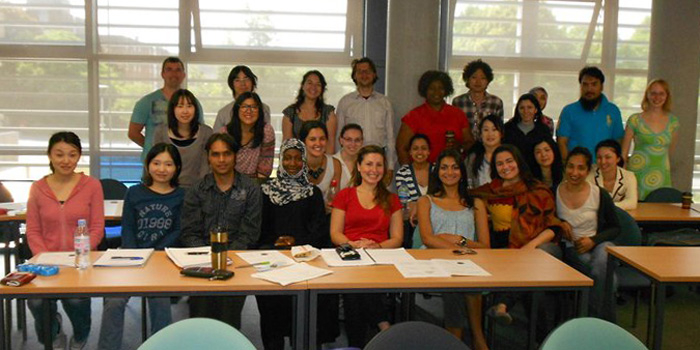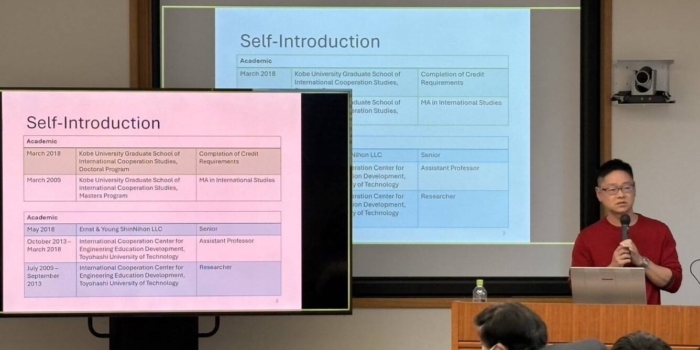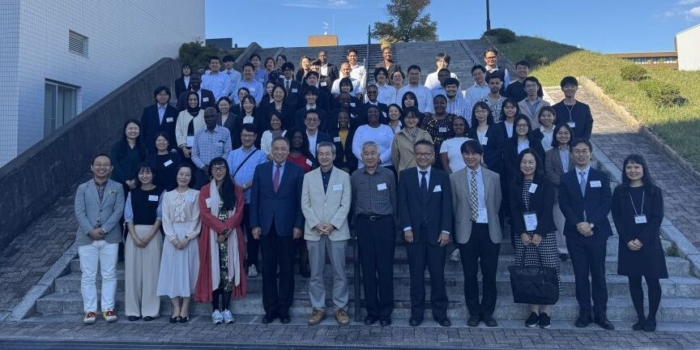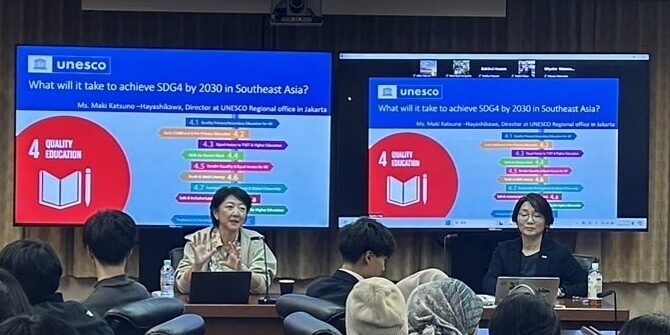
I studied at the University of Sussex through the double degree master’s programme between the University of Sussex and Kobe University from October 2010 to September 2011, and got a master’s degree in International Education and Development from the University of Sussex. After I came back from the UK, I started to write a master’s thesis to submit to Kobe University, and got a master’s degree in International Studies in March 2012.Here, I would like to share my study at the University of Sussex, including my experience in Ogawa seminar.
First, I got two lectures which are theories of education development and education policy related to practice in the fall term from October to December 2010. At the end of the term, students need to submit an essay of 5,000 words for each lecture. We also had a class for academic skills to write an essay in English academically. Students in Ogawa seminar are requires reading a lot of books, documents and articles and summarizing them so that I could deepen what I learnt at the class based on my knowledge and skills from Ogawa seminar.
 In the spring term from January to March 2011, we took two lectures based on our interests. I learnt both education philosophy such as Dewey, Vygotsky and Piaget and current education policy and trends such as EFA and McKinsey report from the lecture of ‘Quality of Education’. EFA is one of the main discussion points in Ogawa seminar, so it is very interesting for me to see the trend from the perspective of pedagogy. In the class of ‘Governance in Education’, we discussed good governance in education and learnt a process of policy making. In addition, this lecture provided us with many examples about school management and decentralization in education and could see the historical context of discussion about governance in education.
In the spring term from January to March 2011, we took two lectures based on our interests. I learnt both education philosophy such as Dewey, Vygotsky and Piaget and current education policy and trends such as EFA and McKinsey report from the lecture of ‘Quality of Education’. EFA is one of the main discussion points in Ogawa seminar, so it is very interesting for me to see the trend from the perspective of pedagogy. In the class of ‘Governance in Education’, we discussed good governance in education and learnt a process of policy making. In addition, this lecture provided us with many examples about school management and decentralization in education and could see the historical context of discussion about governance in education.
We took a class of ‘Research Method’ in the summer term from May to June. I could understand the content of the class deeply because I had practiced to use quantitative method and statistics in Ogawa seminar in advance. Mainly in the class we could learn qualitative method such as interview and observation through working in groups. I could understand very well and improve my skills of qualitative method based on my experience because I had conducted a pre-research for my master’s thesis before coming to the UK.
 Regarding a master’s thesis, I started to work over my ideas from the spring term and submitted the proposal of 3,000 words. Students needed to write a master’s thesis of 15,000 words with help from a tutorwho was allocated to each student and advises us the content of master’s thesis. I wrote a mater’s thesis, “Gender Gap in Academic Achievement – The case of Reading Achievement at Primary Level in Tanzania, Focusing on Child’s Motivation”. I could decide my research topic without limiting research method because I had already practiced how to analyze by quantitative method using Stata. My tutor gave me useful advice for research method and encouraged me a lot to complete my master’s thesis.
Regarding a master’s thesis, I started to work over my ideas from the spring term and submitted the proposal of 3,000 words. Students needed to write a master’s thesis of 15,000 words with help from a tutorwho was allocated to each student and advises us the content of master’s thesis. I wrote a mater’s thesis, “Gender Gap in Academic Achievement – The case of Reading Achievement at Primary Level in Tanzania, Focusing on Child’s Motivation”. I could decide my research topic without limiting research method because I had already practiced how to analyze by quantitative method using Stata. My tutor gave me useful advice for research method and encouraged me a lot to complete my master’s thesis.
After submitting a master’s thesis to the University of Sussex, I returned to Kobe University and started to work on my master’s thesis to graduate from Kobe University after half a year. I had already decided my research plan before I went to the UK, so I conducted a research in Laos for a month and wrote a master’s thesis, “Determinants of Children’s Motivation in the Lao Language Acquisition in Primary Schools: The Case of Vientiane Capital, Lao P.D.R”.
My experience at the University of Sussex was very valuable and I could learn a lot and deepen my knowledge about education development in the UK, a country which leads development studies. Moreover, I could see the current trends in development studies from seminars which were often held at the Institute of Development Studies (IDS). Through this intensive one year, I think I could deepen my philosophy of international cooperation.
I would like to thank Professor Ogawa and all who supported me to study in the UK from the bottom of my heart.
Mariko TAKETANI
Doctoral student,
GSICS, Kobe University
Related









